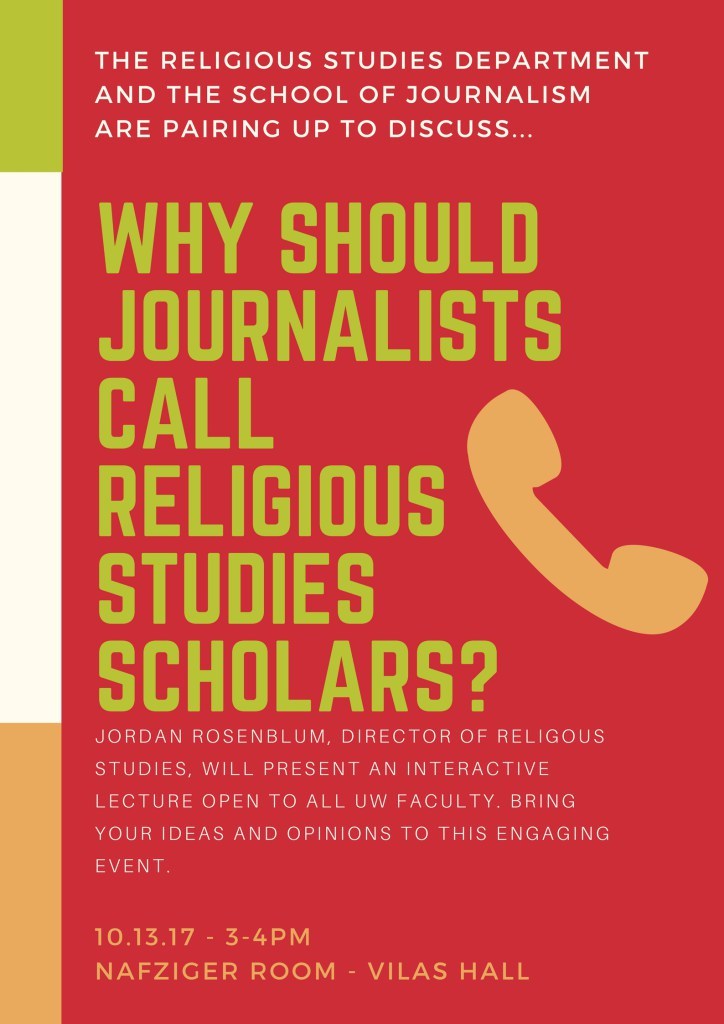As violence erupts in Gaza, journalists often turn to political leaders for breaking-news facts. When Americans honor the memory of Dr. Martin Luther King, Jr., on the 50th anniversary of his assassination, reporters refer back to the reverend and activist’s public remarks.
These news stories, and many others, would be stronger and more accurate if they included the expertise of a scholar of religion, says Susan Ridgely, an associate professor of religious studies. While some journalists might reach out to a priest, rabbi or imam, they might not think to contact a religious studies scholar. And yet scholars can offer broad-based historical and social perspectives that help put events into context.
“The coverage of Dr. King could have benefited from more attention to his religious ideology,” Ridgely says. “Much is given to his public speeches and almost none to his sermons. To understand his vision, however, we need to understand the fullness of what he was trying to convey to the American people and how he shaped it depending on his audience.”
And the current situation in Gaza, she says, “could be understood in a more complete way if more attention were paid to how religion shapes and is shaped by the political situation.”


A collaboration between UW-Madison’s Religious Studies Program and the School of Journalism and Mass Communication is striving to create more nuanced coverage by bringing journalism and religious studies communities together.
Ridgely and Michael Wagner, an associate professor of journalism, have partnered as recipients of a two-year grant from the Luce/ACLS Program in Religion, Journalism and International Affairs designed to foster new connections between scholars and journalists covering issues of global importance.
Workshops began in September 2017 and are held monthly while classes are in session. Topics have ranged from “Building Relationships with Journalists” to “Religion’s Role in Fake News,” and upcoming events will address how to forge interdisciplinary collaboration and explore cult narrative in media coverage of the Branch Davidians.


Whether it’s a reporter for a local newspaper with a religion section or a journalist covering an international issue with a religious undercurrent, a major problem is knowing — or choosing — who to interview and quote.
“The go-to sources are not always the best for the verifiable truth,” Wagner says, referring to priests, rabbis and religious leaders. “Reflexively, journalists don’t think of calling a religious studies expert.”
But that’s like asking a person who drives a car over a bridge to weigh in on issues about a bridge’s safety, as opposed to consulting an engineer who specializes in it, Wagner says.
The flip side of the problem is that religious studies scholars often don’t know how to share their expertise, even if they have an interest in making themselves and their work available to the media.
Concerns of both journalists and scholars are addressed in workshops, and the project’s website is also intended to become a resource for both journalists and scholars. Both Wagner and Ridgely hope the project continues to grow, but they’re pleased with what already has been accomplished.
“People in departments that historically haven’t spent time together are working together on an issue they both perceive,” he says. “We’ve gotten so much out of the conversations that it feels like it’s already a success.”
Upcoming Events
Forging Interdisciplinary Research in Religious Studies and Mass Communication
April 13
Michael Wagner of the School of Journalism and Mass Communication explores searching for research topics, questions, potential hypotheses and potential modes of analysis to conduct collaborative, interdisciplinary research about religious studies and mass communication. Wagner will facilitate the discussion by synthesizing work that tackles issues of media and journalism. Faculty, graduate students and undergraduate students are welcome.
The Cult Narrative and the Branch Davidians
May 3
Catherine Wessinger, a professor of the history of religions at Loyola University New Orleans, discusses the events surrounding the raid, shootout, siege and fire that led to the deaths of 76 members of a religious community near Waco, Texas, in 1993. A number of reporters and documentaries continue to utilize the cult narrative as a simple, and often sensationalized, explanation of the events, obscuring the humanity of the Branch Davidians. Open to the public.
For more information, visit journalismandreligion.journalism.wisc.edu.


